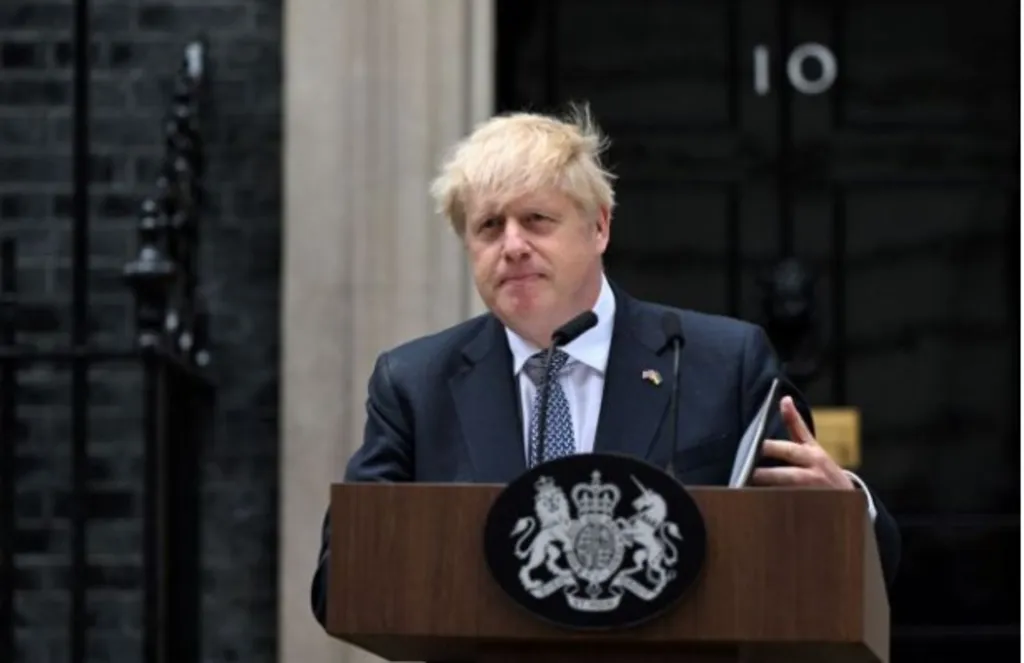 World
World

 |
| Britain's Prime Minister Boris Johnson speaks in front of 10 Downing Street in central London on July 7, announcing his resignation. AFP/VNA Photo |
{ "id": "d3kVi8coX1", "type": "myToolImages", "data": { "data": "" } }
Ollie Arci
It took just two frenetic days, and a cavalcade of ministerial resignations, to bring an end to Boris Johnson’s tumultuous tenure as British Prime Minister.
As one of the architects of the campaign to bring the UK out of the European Union, Johnson remained the last man standing after the controversial issue ended the premierships of two former Conservative leaders, and left him in the unenviable position of delivering on grandiose promises made in the run-up to the 2016 referendum.
But deliver he did, and if nothing else, Johnson’s short stint as PM will be remembered as one in which Brexit finally ‘got done’. That is, if it weren’t for a seemingly non-stop barrage of crises, some of which were of his own making. The golden era of post-Brexit Britain was quickly overshadowed by a pandemic, economic downturn, geopolitical conflicts and most recently a cost-of-living crisis that will require a significant rethink of monetary policy. It was, however, the stream of headlines on personal matters and a growing unease with the culture in government that put the nail in the coffin.
For many lawmakers, and as he said himself in his resignation speech, the Darwinian system of British politics had decided the country, and the Conservative party, are due for a change in leadership. It was clear that while trust had ebbed away, Johnson’s tenacity was in full force, and only once the clamour among his own cabinet reached fever pitch, did he accept the game was up.
The Conservative party, ruthless in its ability to turn on once-vaunted figureheads, made its move and the infamous lectern was set up outside the door of Number 10.
But where does Boris leave Britain? And what can the country look forward to in the coming months and years?
Time to leave
A former journalist, MP and occasional entertainer, Johnson was a public darling thanks to his bubbly and boisterous persona, frequently embracing publicity and boosting his own political stature in the process. This helped to widen his appeal beyond average Tory voters and led to a position as London mayor. But it was the Brexit campaign that really cemented his place in the running as a prime ministerial contender.
Following a failed attempt after David Cameron’s post-referendum resignation, the chance came after a second Prime Minister was felled by the European question. It now seemed obvious that a Leaver was the one to get the job done. Taking the reins from Theresa May, who floundered amid red lines and limits on withdrawal agreements with EU negotiators, Johnson’s freewheeling style and devil-may-care attitude lent themselves more successfully to the minutiae of international trade. Or more precisely, pushing through with painful decisions to put an end to the whole affair.
The celebrations were short-lived, however, as COVID reared its ugly head and dragged the world into a prolonged period of suffering. Some of the first criticisms of the government were in response to a lagging lockdown effort, with the UK following a business-as-usual strategy while others battened down the hatches.
However, glimmers of success came with a speedy and successful vaccine roll-out, allowing the country to achieve a sense of normality and businesses to reopen. But it was this period that came back to bite Boris, with reports of parties in the halls of power damaging public trust and misguided choices of staff heightening resentment towards Downing Street.
It may have been the confidence vote among Tory colleagues that left the PM mortally wounded, with 41 per cent of lawmakers voting against him on June 6.
Conservative leaders have often struggled to unite disparate wings of their party, and Johnson was no exception, with his One Nation Conservatism frequently pressured rightwards by the European Research Group and figures like Jacob Rees-Mogg. Many would have preferred a more predictable form of politics, steadfastness over showmanship, to put the country on the right track after years of upheaval.
But Johnson’s ambitions may well have been broader than the British borders, perhaps influenced by his time as foreign secretary, and he managed to forge friendly relations with world leaders, including Donald Trump. And, of course, setting out the UK’s stall as a global trading partner after ties were cut with the continent.
Looking back, many will feel Johnson squandered an unassailable majority achieved in the 2019 snap election – the party’s largest since 1987. The conflicts and quarrels of the last few days and weeks could also give a much-needed boost to the Labour party, and leader Keir Starmer’s designs on government.
When Boris does finally fit the last of his boxes into a moving truck, some will breathe a sigh of relief, and Conservatives country-wide could be hoping for a safer and more stable pair of hands at the helm.
Them’s the breaks. VNS